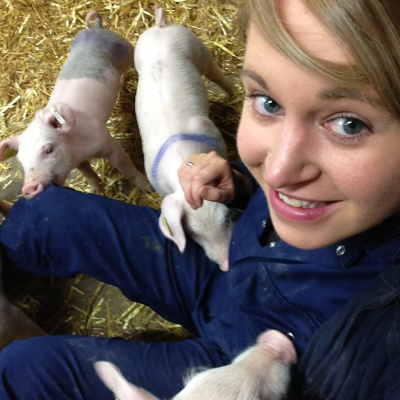CIEL | Meet the Scientist
Dr Jessica Martin
Elizabeth Creak Associate Professor of Animal Welfare and Innovation

Jessica is an award-winning translational researcher in animal welfare and innovation, with over 10 years of professional experience in the field of animal behaviour and welfare in farming and laboratory environments.
What project/s are you currently working on?
My animal welfare research involves the utilisation of novel approaches and problem-solving to develop effective and relevant advancements in animal welfare which strategically align with future ethical farming and the use of animals for research purposes. All my projects involve working industry and relevant stakeholders to inform animal welfare priorities and complement promotion of sustainable and ethical use of animals.
My most recent research focusses on animal affective states and consciousness to eliminate suffering relating to transportation, or to the end-of-life in both agricultural and laboratory settings. Research focussing on end-of-life is critically important due to the huge numbers of animals it impacts each year. The methods we use are incredibly important so that we can minimise animal suffering, both physically and mentally for individual animals, and also on a grand scale.
My current research projects include:
- Breathless Birds: Does air hunger impact the welfare of poultry at slaughter? (BBSRC)
- Ensuring humane deaths for laboratory birds (NC3Rs)
- Depopulation strategies for pigs and poultry (Industry funded).
What would be your ideal research project, assuming no barriers to resource
In the space of 60 years, the pig and poultry farming industry has shifted from the use of various forms of electrical stunning to controlled atmosphere stunning (CAS). This was seen as a major welfare advantage due to the welfare concerns related to electrical stunning and handling as well as offering improvements to meat and carcass quality. However, as early as 2004 the European Food Safety Authority (EFSA) raised concerns in relation to the use carbon dioxide (CO2). Exposure of conscious animals to CO2 raises two major potential welfare concerns: pain due to activation of mucosal nociceptors, and unpleasant respiratory sensations (breathlessness). The pig and poultry industry are currently in a very challenging position and need support to make informed changes in practices based on scientifically informed policy updates. Where should they be going next, and where should they be investing for future technologies which meet both animal welfare but sustainability goals? Our previous funded research explored whether low atmospheric pressure stunning (LAPS) was a humane alternative to CO2 stunning in pigs (Defra). The results of this project conclusively show that both LAPS and CO2 stunning are associated with several indicators of poor welfare and are aversive to pigs. A project which explores the next steps for pig industry in terms of stunning and slaughter is essential!
How did you arrive at doing what you do now?
I love problem-solving and that’s why I have always been attracted to science. Having graduated from the University of Edinburgh with a BSc (Hons) in Zoology and an MSc in Applied Animal Behaviour and Animal Welfare, I progressed onto a PhD in Animal Health at the University of Glasgow while working part-time as a research assistant. I undertook a post-doc with SRUC and then returned to the University of Edinburgh in 2015 to work within the Vet School and Roslin Institute. I joined the School of Natural and Environmental Sciences, Newcastle University in late 2022.
More about Newcastle University
Newcastle University’s agricultural expertise is focussed on “providing for people while also providing a positive environment for livestock and wildlife”. Key areas we are currently involved in are:
- Animal health and welfare
- Soil health and function
- Agriculture and the environment
- Animal nutrition and resource efficiency
- Precision agriculture
- Sustainable animal production
- Crop health and protection
- Comparative molecular animal physiology
- Enterprise and engagement
Find out more about Animal Sciences research at Newcastle University.




